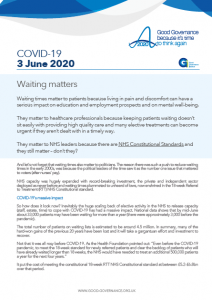Waiting matters
03 June 2020

Waiting times matter to patients because living in pain and discomfort can have a serious impact on education and employment prospects and on mental well-being.
They matter to healthcare professionals because keeping patients waiting doesn’t sit easily with providing high quality care and many elective treatments can become urgent if they aren’t dealt with in a timely way.
They matter to NHS leaders because there are NHS Constitutional Standards and they still matter – don’t they?
And let’s not forget that waiting times also matter to politicians. The reason there was such a push to reduce waiting times in the early 2000s, was because the political leaders of the time saw it as the number one issue that mattered to voters (after nurses’ pay).
NHS capacity was hugely expanded with record-breaking investment, the private and independent sector deployed as never before and waiting times plummeted to unheard of lows, now enshrined in the 18-week Referral to Treatment (RTT) NHS Constitutional standard.
COVID-19’s massive impact
So how does it look now? Inevitably the huge scaling back of elective activity in the NHS to release capacity (staff, estate, time) to cope with COVID-19 has had a massive impact. National data shows that by mid-June about 33,000 patients may have been waiting for more than a year (there were approximately 3,000 before the pandemic).
The total number of patients on waiting lists is estimated to be around 4.5 million. In summary, many of the hard-won gains of the previous 20 years have been lost and it will take a gargantuan effort and investment to recover.
Not that it was all rosy before COVID-19. As the Health Foundation pointed out: “Even before the COVID-19 pandemic, to meet the 18-week standard for newly referred patients and clear the backlog of patients who will have already waited longer than 18 weeks, the NHS would have needed to treat an additional 500,000 patients a year for the next four years.”
It put the cost of meeting the constitutional 18-week RTT NHS Constitutional standard at between £5.2-£6.8bn over that period.
It remains unclear what level of elective activity can be restored in the next few months. Some estimates put it as high as 80%, others as low as 40%. Of course, this assumes that the partial lifting of the lockdown, the crowded beaches and the busy high streets don’t bring with them a second wave of coronavirus admissions requiring trusts to pull back on their plans to scale up elective activity.
Questions for boards
Because waiting times really do matter,this is an important, legitimate and essential area for boards to seek assurance. Some questions boards may wish to ask include:
- What is the shape of our waiting list now and what do we think it will look like over the next few months?
- Will there be a surge in referrals as fear of COVID-19 subsides (assuming it does)?
- For our long waiters, what steps have we taken to ensure that there is no harm being done (or at least that it is being minimised) and that patients are being risk assessed?
- What are our processes for patients who have removed themselves from the waiting list to ensure that they are not coming to avoidable harm?
- What communication has there been with patients and their GPs?
- Are our practices aligned with those of the local system and with commissioners’ expectations, and are our regulators and stakeholders aware (and supportive)?
- What are the processes for stepping up activity, including clinical prioritisation, infection prevention and control, and are they aligned with national guidance?
- What are our contingency plans if there is a second wave of COVID-19 admissions?
- What are the financial consequences of scaling up? Can we afford it, will commissioners pay for it, is it all wrapped up in the block contract?
- Are there any consequences for professional staff of such a long pause in practicing – particularly for surgeons and surgical teams? Is any refresher training necessary?
- Does our BAF and corporate risk register capture the risks adequately and are our board committees focused on providing appropriate assurance?
Then there’s the future of waiting list management and the NHS ‘elective offer’ to consider. Perhaps now is the time to genuinely plan for system-wide elective treatment protocols, eliminate procedures of no proven clinical value, improve data quality and patient communication and move to system-wide waiting list management.
How can boards seize this unforeseen and once-in-a-lifetime opportunity to re-engineer a critical part of the NHS?
If this update prompts any comments or questions we are keen to hear from you. Please call us on 07732 681120 or email advice@good-governance.org.uk

Darren Grayson
Executive Director
(Partner)

